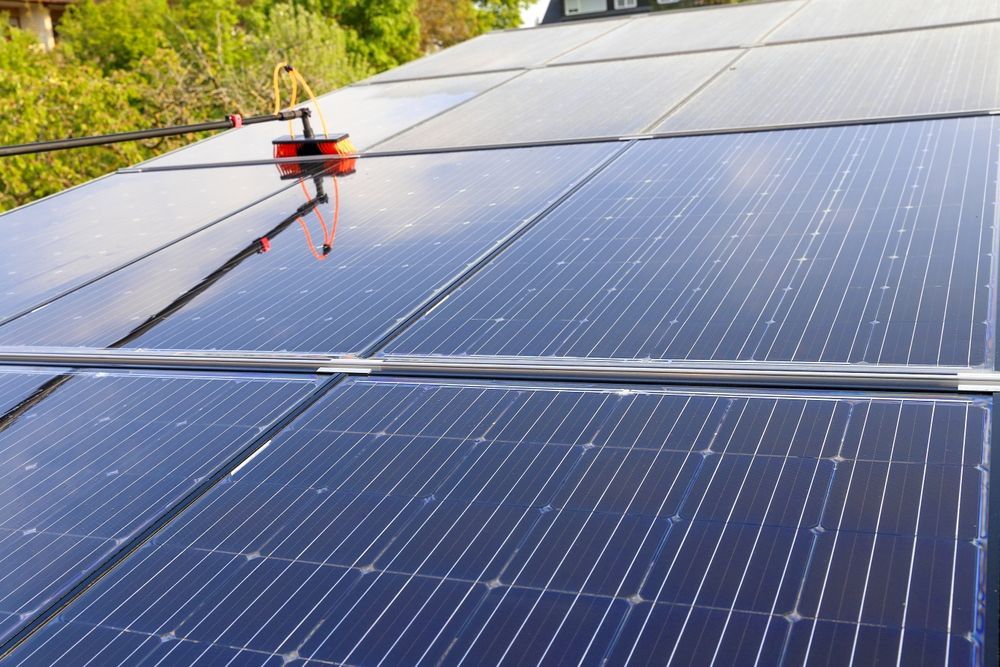The Ultimate Guide to Solar Panel Cleaning
Unlocking the Full Potential: The Ultimate Guide to Solar Panel Cleaning
Harnessing the power of the sun through solar panels has become a cornerstone of sustainable energy production. These marvels of modern technology silently convert sunlight into electricity, providing an eco-friendly alternative to conventional power sources. However, for solar panels to operate at peak efficiency, regular cleaning is imperative. This comprehensive guide delves into the significance of solar panel cleaning, the factors influencing performance, various cleaning methods, and essential tips for ensuring optimal energy production.
The Critical Role of Solar Panel Cleaning:
Solar panels are exposed to the elements, facing a barrage of environmental factors that can impede their performance over time. Dust, dirt, pollen, bird droppings, and air pollution gradually accumulate on the panel surface, forming a thin layer that obstructs sunlight absorption. This accumulation can significantly diminish the efficiency of solar panels, affecting their ability to convert sunlight into electricity. Regular cleaning is not merely a cosmetic concern; it is an essential maintenance practice to unlock the full potential of solar energy systems.
Factors Influencing Solar Panel Performance:
Understanding the factors that impact the performance of solar panels is crucial for appreciating the importance of regular cleaning:
Dust and Dirt:
Dust and dirt, prevalent in arid regions or areas undergoing construction, can settle on solar panels, creating a barrier that hampers sunlight absorption.
Bird Droppings and Debris:
Bird droppings, leaves, and other debris can cast shadows on solar panels, causing localized shading that reduces the overall energy output.
Air Pollution:
Airborne pollutants, such as industrial emissions and pollen, can adhere to the surface of solar panels, forming a film that diminishes their light-capturing efficiency.
Weather Conditions:
Rain, snow, and high humidity levels can impact solar panel cleanliness. While rain may wash away some dirt, it might not be sufficient to maintain optimal cleanliness.
Methods of Solar Panel Cleaning:
Several cleaning methods can be employed to keep solar panels in pristine condition, each with its own advantages based on factors like accessibility, weather conditions, and the level of dirt or debris:
Water and Detergent:
A simple mixture of water and a mild detergent can effectively break down dirt and grime. Soft brushes or sponges can then be used to gently scrub the surface, followed by a thorough rinse.
Hose or Pressure Washer:
For easily accessible solar panels, a regular hose or a low-pressure washer can be used to rinse away loose dirt. It's crucial to avoid high-pressure washers, as they can damage the protective coating on the panels.
Automated Cleaning Systems:
Larger solar installations may employ automated cleaning systems equipped with brushes or wipers. These systems are designed to move across the panels, ensuring regular cleaning without manual intervention.
Professional Cleaning Services:
In cases where safety or accessibility is a concern, professional cleaning services with the necessary tools and expertise can be engaged to ensure thorough and safe cleaning.
Essential Tips for Effective Solar Panel Cleaning:
To achieve optimal results and maintain the integrity of solar panels, consider the following tips:
Regular Inspection:
Conduct regular visual inspections to identify any buildup of dirt, bird droppings, or debris on the panels. Early detection allows for timely cleaning.
Safe Cleaning Practices:
If opting for manual cleaning, use soft materials like microfiber cloths or soft brushes to avoid scratching the panel surface. Ensure that the cleaning process does not compromise personal safety.
Water Quality:
Use deionized or distilled water to prevent mineral deposits on the panels, especially in regions with hard water.
Cleaning During Optimal Times:
Schedule cleaning during early mornings or late afternoons to avoid exposing hot panels to cold water, which may lead to thermal stress.
Avoid Abrasive Materials:
Refrain from using abrasive materials, harsh chemicals, or abrasive cleaning pads, as they can damage the anti-reflective coating on the panels.
Measuring the Impact:
The impact of solar panel cleaning on energy production is significant. Studies have shown that dirty solar panels can experience an efficiency loss of up to 20%. Regular cleaning has been observed to restore efficiency and, in some cases, surpass the performance of dirty panels. By maintaining a clean surface, solar panels can consistently operate at their rated capacity, ensuring optimal energy production.
Environmental Considerations:
Approaching the solar panel cleaning process with environmental considerations in mind is essential. Opt for eco-friendly cleaning agents, minimize water usage, and explore automated cleaning systems that optimize water efficiency. Striking a balance between maintaining panel cleanliness and adopting sustainable practices contributes to a holistic approach to solar energy production.
Conclusion:
In the pursuit of sustainable energy, solar panels stand as beacons of innovation. To ensure they operate at peak efficiency and deliver the expected return on investment, regular cleaning is not just a maintenance task but a strategic necessity. Whether through DIY methods, professional services, or automated systems, the commitment to solar panel cleanliness ensures that these remarkable devices continue to harness the power of the sun and contribute to a greener, more sustainable future. As we unlock the full potential of solar energy, let us not forget the simple yet profound impact of keeping our solar panels clean.




Experience our professional Window Cleaning service today!
BROWSE OUR SITE
SERVICES AREAS
Saint George, Washington, Santa Clara, Hurricane, Ivins, Pine Valley, Central, Veyo, La Verkin, Bloomington, Dammeron Valley, Toquerville, Leeds
CONTACT INFO
Phone: (435) 525-0090
Email: zingstgeorge@gmail.com
Hours:
Mon-Saturday: 8am-5pm
Sunday: Closed
All Rights Reserved | Zing Services
All Rights Reserved | Zing Services | Christmas Lights Terms of Service | Window Cleaning Terms of Service






